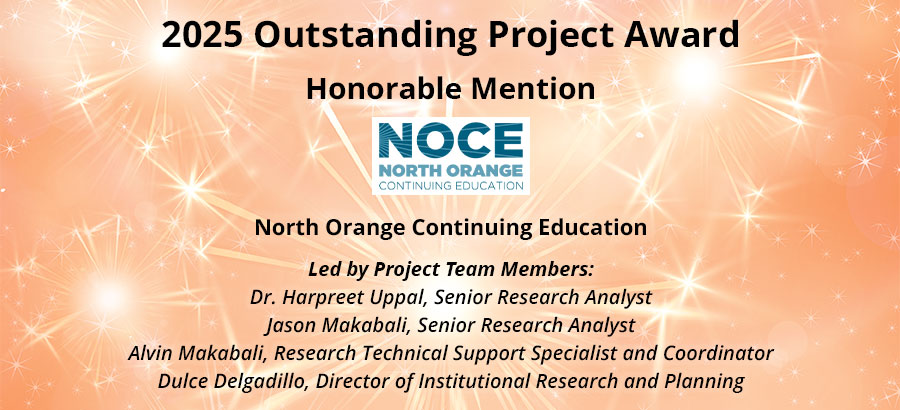
In celebration of their hard work and dedication, The RP Group is pleased to acknowledge Irvine Valley College with an honorable mention for the 2025 RP Group Outstanding Project Award.
Their project, “Improving the Student Experience and Increasing Access by Streamlining Workflows: A Collaborative Between EOPS and Research,” offered an important perspective. Acknowledging the potential future landscape of reduced budgets and smaller categorical funds, colleges are faced with the reality of (re)evaluating their programs and services. While most institutional research projects focus on the effectiveness of programs for students, many overlook the opportunity to evaluate and modify the human resources of programs.
This project did both and exemplified a collaboration between Research and EOPS going beyond “just” data and instead creating a true partnership that completely redesigned the student and staff experience. At the start of the project, the researchers identified two major pain points:
-
The application process to join EOPS was burdensome for students and tedious to review for employees.
-
The eligibility requirements for students to remain in EOPS required regular manual checks throughout the semester that were time-consuming and prone to human error.
While access barriers are well known, the second point was somewhat of a revelation for the researchers on how many hours are spent on menial tasks for regular (sometimes weekly) checks. Therefore, the team used automation to streamline three business processes of
-
the student EOPS application process,
-
the EOPS eligibility check, and
-
the EOPS status check to maintain eligibility.
Prior to this intervention, at the beginning of a semester, students who were aware of the EOPS program were required to complete an application and, if they met the requirements, were able to join the program a few weeks into the semester. To reduce the burden of this process, the EOPS application was revised in collaboration with current EOPS students. This new approach uses internal data to proactively assess student eligibility for the program. As a result, eligible students are notified of their acceptance and onboarded prior to each semester. By moving the application process to before the semester starts, EOPS was able to hold a welcome event to foster a sense of community and belonging before classes started.
To estimate a true causal estimate of the effect of the changes in the application process, the researchers employed a randomized control and treatment (RCT) experiment. This RCT found that students impacted by the revised admission process had an enrollment rate into EOPS that was 272% higher in comparison to the old process.
To ensure students maintain their EOPS eligibility, employees are required to monitor each individual student’s academic progress and program eligibility requirements. These tasks were mundane and tedious and involved caveats vulnerable to human error. Research was able to automate these tasks, freeing an estimated 150 employee hours per semester. This newly found time allowed employees to case-manage their students and more intentionally focus on student needs.
By adopting a data-driven approach, both the student and employee experience can be enhanced without diverting resources from student support. Many programs face the same challenges as EOPS, and the solutions implemented for this project are adaptable. Research offices have the tools necessary to ensure that joining a program is simple for students, while also enabling staff to manage these programs efficiently and effectively.

In celebration of their hard work and dedication, The RP Group is pleased to acknowledge North Orange Continuing Education (NOCE) with an honorable mention for the 2025 RP Group Outstanding Project Award.
Their project, “From Enrollment to Completion: Exploring Noncredit Time to Completion,” aimed to understand and address the time it takes noncredit students to complete their educational goals, focusing on populations served by NOCE.
Noncredit programs are vital for supporting diverse student groups, including adult learners, English language learners, and those pursuing high school equivalency. These programs are uniquely positioned to provide flexible, accessible, and affordable education to marginalized populations often facing significant barriers.
The project’s goals were to analyze the average and median time to completion across various noncredit programs and identify factors influencing these timelines, such as concurrent enrollment, transfer credits, and enrollment gaps. By exploring the experiences of completers and non-completers, the study sought to illuminate the barriers students face and provide actionable recommendations for institutional improvement.
Methodologically, the research examined enrollment data, completion records, and demographic variables for programs like High School Diploma, Career Technical Education (CTE), and English as a Second Language (ESL). Specific variables included concurrent enrollment patterns, credit transfer, and the presence and length of enrollment gaps. The analysis revealed significant insights, such as the impact of gap years on completion times, which ranged from one to 18 years, and highlighted the barriers that prolonged completion, including work commitments, lack of tailored support, and external challenges like childcare and transportation.
This project contributes to a deeper understanding of how traditional credit-based methodologies and metrics may not fully align with noncredit programs. Noncredit education serves populations with unique needs and pathways, and understanding these programs and the experiences of their students is critical to developing meaningful metrics and milestones. These insights are essential for designing systems and interventions that truly reflect and support noncredit learners’ journeys.
Key findings emphasized the importance of addressing these barriers to improve equitable access and success. Lessons learned include the need for robust support systems, better communication of available resources, and targeted interventions. For example, High School Diploma students with consistent enrollment completed their programs significantly faster than those with gaps.
Stakeholders impacted by the project include adult learners, faculty, and institutional leaders. By sharing these findings, NOCE aims to foster data-informed decision-making that improves student outcomes and ensures noncredit education remains a viable pathway for nontraditional learners.